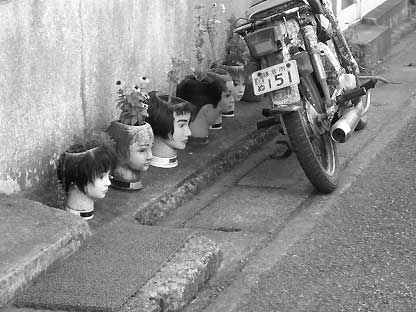Fuji-Yoshida
 Psychiatrist Hidetoshi Nishijima of the Japan Medical Association, in an interview last year stated that the importance of family life to the normal Japanese individual has gradually replaced the “perception of lifetime employment at one company,” and the importance of a job. Dr. Nishijima feels that though cases of exhaustion depression and promotion triggered depression due to a huge dependence on the company have been decreasing, frequent absence from work syndrome, aversion depression, avoidant personality disorder and maladjustment stemming from mental disorders have increased. This is why suicide numbers have not decreased. Due to the rising suicide rate, Japan has become known as a society of stress, and the cause is depression. Though the Japanese federal government allocated 450 million yen to research on suicide prevention countermeasures as part of the 2001 Japan regeneration plan, critics and police agencies alike are still predicting another horrific year for the Aokigahara woods in 2003, among other suicide hot spots. The remains of 78 apparent suicide victims were found hanging in the Aokigahara woods at the foot of Mount Fuji last year, a record high for the “suicide forest,” according to Fuji-Yoshida police station in Yamanashi Prefecture. Fuji-Yoshida police issued a plea to people feeling suicidal to seek professional help.
Psychiatrist Hidetoshi Nishijima of the Japan Medical Association, in an interview last year stated that the importance of family life to the normal Japanese individual has gradually replaced the “perception of lifetime employment at one company,” and the importance of a job. Dr. Nishijima feels that though cases of exhaustion depression and promotion triggered depression due to a huge dependence on the company have been decreasing, frequent absence from work syndrome, aversion depression, avoidant personality disorder and maladjustment stemming from mental disorders have increased. This is why suicide numbers have not decreased. Due to the rising suicide rate, Japan has become known as a society of stress, and the cause is depression. Though the Japanese federal government allocated 450 million yen to research on suicide prevention countermeasures as part of the 2001 Japan regeneration plan, critics and police agencies alike are still predicting another horrific year for the Aokigahara woods in 2003, among other suicide hot spots. The remains of 78 apparent suicide victims were found hanging in the Aokigahara woods at the foot of Mount Fuji last year, a record high for the “suicide forest,” according to Fuji-Yoshida police station in Yamanashi Prefecture. Fuji-Yoshida police issued a plea to people feeling suicidal to seek professional help.

